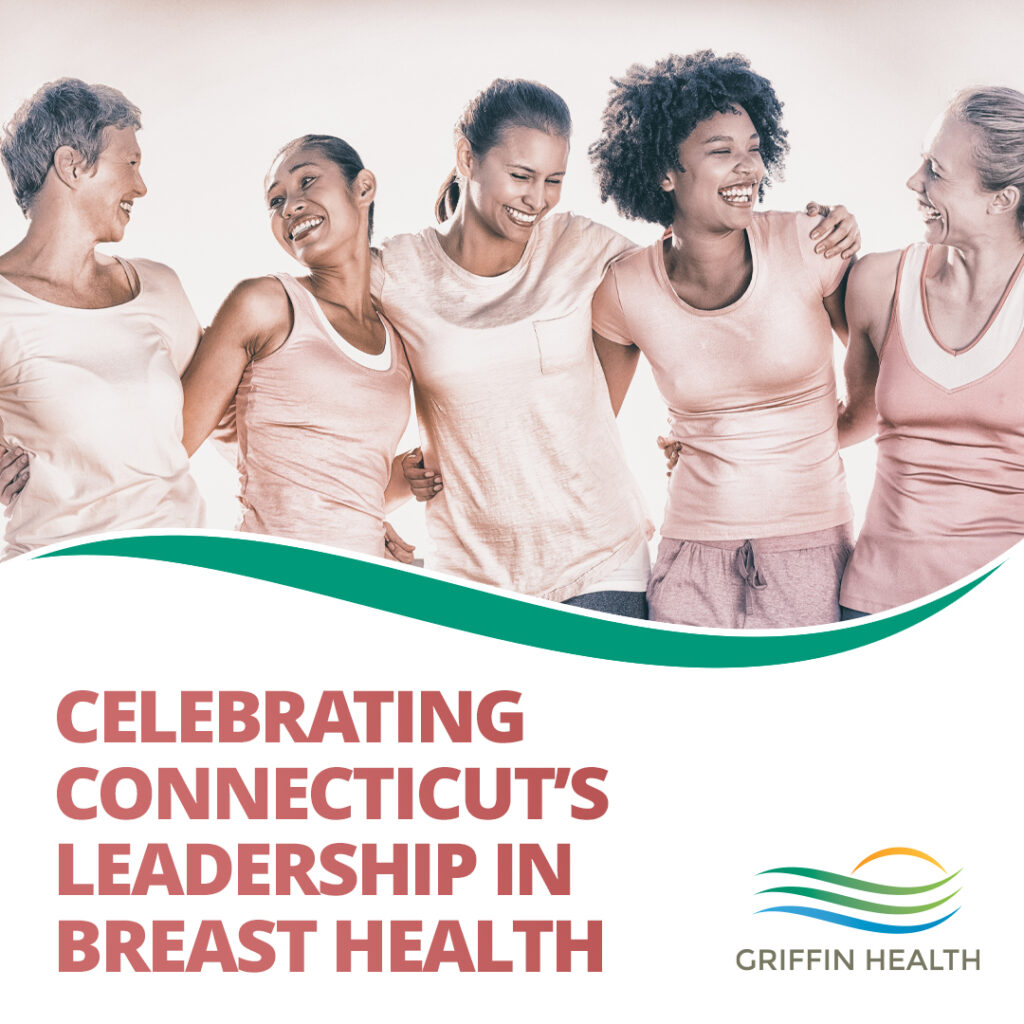
By Hewitt Center for Breast Wellness Medical Director Denise Barajas, MD, and Griffin Health Commnications and Public Affairs Intern Celina Daigle
This year, Breast Cancer Awareness Month has a special meaning for Connecticut as recently enacted national laws show how our home state is a leader in making sure women get the support for optimal breast cancer detection and treatment.
On Oct. 1, 2009, Connecticut passed a law stating that insurance companies should allow for a baseline mammography for women ages 35-39 and should cover a total screening every year for women 40 years and older.
The law also stated that if dense breast tissue is found during a mammogram, the patient must be informed. This notification is important to a patient’s health as dense breast tissue can hide cancer and other growths on a mammogram. In addition to the notification, the law states that patients with dense breasts may benefit from additional screenings such as ultrasound which can penetrate dense tissue and locate any cancerous growths.
On Sept. 10, the United States followed Connecticut’s lead and passed the National Dense Breast Disclosure Law. This mandated that all healthcare providers must inform their patients about their breast density after having a mammography and inform them of other screening options.
Understanding Dense Breasts
There are four levels of breast density tissue: Mostly Fatty; Scattered Fibroglandular; Heterogeneously Dense; and Extremely Dense. Breast density increases from level one to level four. Women with Extremely Dense breast tissue are four times more likely to develop breast cancer than those with mostly fatty breast tissue, and about 40% of cancerous growths cannot be seen on their mammograms. In light of the facts that one in eight women in the U.S. will develop breast cancer in their lifetimes and roughly half of the women in the country have dense breasts, support for annual mammograms, dense breast notification and additional further screenings.
Reducing Breast Cancer Risk
The risk of developing breast cancer varies based on tissue density, diet, exercise, hormonal changes, and race. Here are some of the leading factors for breast cancer:
Alcohol Consumption – If a woman consumes one alcoholic beverage a day, her risk increases about 7-10%, and increases to a startling 20% higher risk if she consumes two to three alcoholic drinks per day.
Obesity and Weight Gain – Obesity increases the risk of breast cancer, especially after menopause. Ovaries stop producing estrogen post menopause, and the hormone comes from fat tissue instead. Therefore, the more fat tissue a woman has, the more estrogen is produced after menopause, leading to an increased risk of breast cancer.
Physical Activity and Diet – To help maintain a healthy weight and decrease the risk for breast cancer, a balanced diet with plenty of fruits, vegetables, and protein should be paired with about 150 to 130 minutes of moderate exercise per week, or 75-150 minutes of high intensity exercise per week. This also helps to balance hormone levels and treat inflammation.
Hormonal Changes – Oral birth control pills have been determined to slightly increase the risk of developing breast cancer. Within 10 years of stopping use, however, the risk goes back to normal. Other forms of birth control such as hormonal implants, patches and shots, could fuel a higher risk for breast cancer, but studies are not conclusive. For postmenopausal women, doing estrogen and progesterone therapy to help ease menopause symptoms come with an increased risk of breast cancer after about four years of use. Studies on estrogen therapy alone have provided mixed results in determining whether it does or does not increase cancer development.
Race and Socioeconomic Standing – Black women are less likely to be diagnosed with breast cancer than White women, yet the death rate for Black women is 40% higher than that of White women. Black women are also more likely to get an aggressive subtype of breast cancer and have a higher mortality rate.
Schedule Your Mammogram
The Hewitt Center for Breast Wellness at Griffin Hospital combines state-of-the-art technology, a team of highly trained physicians and staff, and a Planetree healing environment to offer our patients a comprehensive range of personalized breast care and wellness services. The Center features two new, state-of-the-art digital mammography suites, two breast ultrasound suites, and an advanced system to perform stereotactic biopsy. Visit griffinhealth.org/breast for more information. To schedule a mammography, call Griffin Hospital Central Scheduling at 203-732-7101.
About Dr. Denise Barajas
Denise Barajas, MD, FACS, is the Medical Director of The Hewitt Center for Breast Wellness, an experienced breast surgeon and expert on breast cancer screening, early detection, and treatment. Visit griffinhealth.org/doctors/denise-barajas-md to learn more.